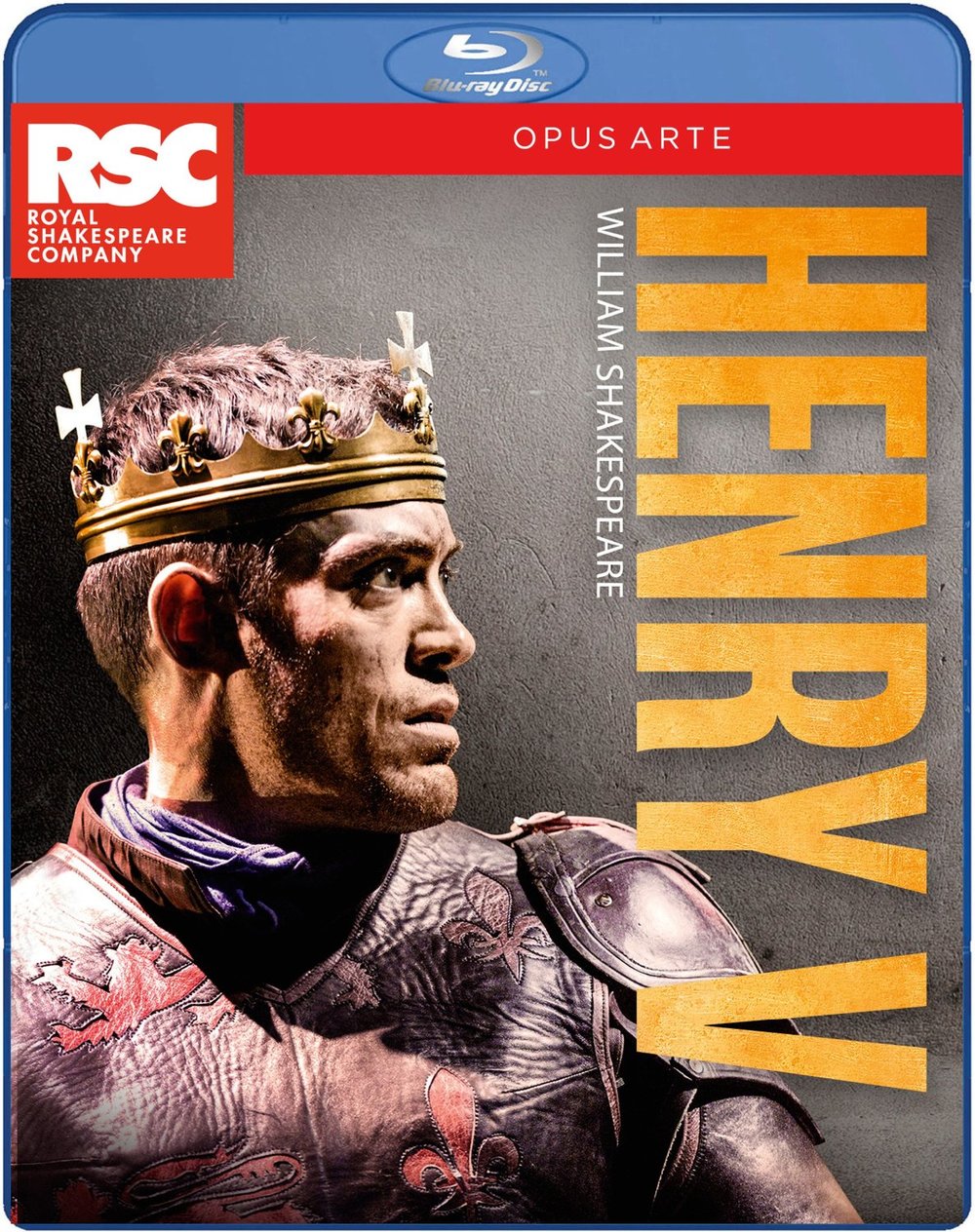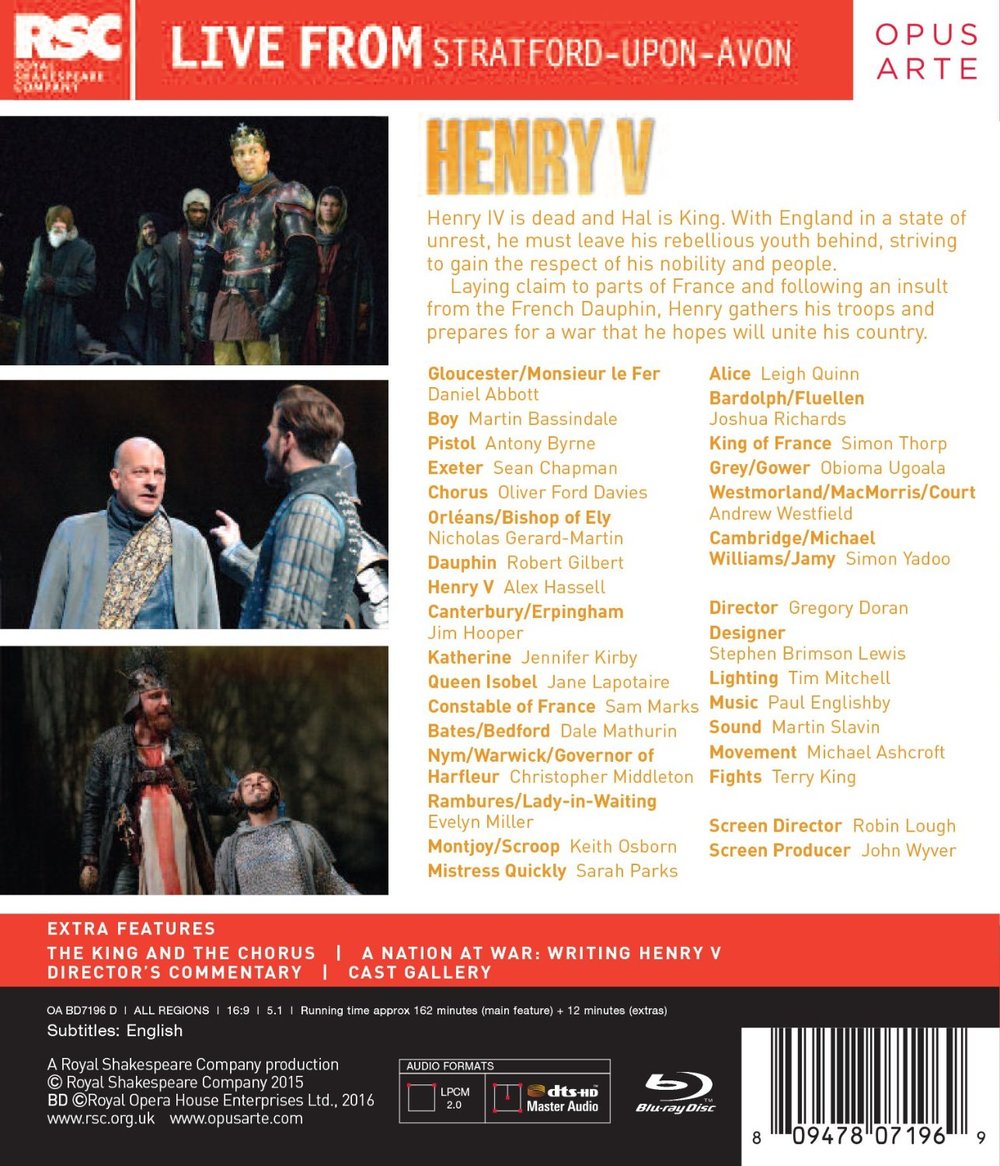

Shakespeare Henry V play. Directed 2015 by Gregory Doran at the Royal Shakespeare Theatre, Stratford-upon-Avon. Stars for the English: Oliver Ford Davies (Chorus), Alex Hassell (King Henry V), Dale Mathurin (Bedford/Bates), Daniel Abbott (Gloucester/Monsieur le Fer), Jim Hooper (Canterbury/Erpingham), Nicholas Gerard-Martin (Bishop of Ely/Orléans), Sean Chapman (Exeter), Andrew Westfield (Westmorland/MacMorris/Court), Christopher Middleton (Warwick/Nym), Keith Osborn (Scroop), Simon Yadoo (Cambridge/Jamy/Michael Williams), Obioma Ugoala (Grey/Gower), Joshua Richards (Bardolph/Fluellen), Anthony Byrne (Pistol), Sarah Parks (Mistress Quickly), and Martin Bassindale (Boy). Stars for the French: Simon Thorp (King of France), Jane Lapotaire (Queen Isobel), Robert Gilbert (Dauphin), Jennifer Kirby (Katherine), Leigh Quinn (Alice), Keith Osborn (Montjoy), Sam Marks (Constable of France), Christopher Middleton (Governer of Harfleur), and Evelyn Miller (Rambures/Lady-in-Waiting). Features the musicians Helena Raeburn (soprano), Max Gittings (woodwind), Samantha Norman (violin), Nick Lee (guitar), Andre Stone-Fewings (trumpet), Chris Sedden (trumpet), Ian Foster (tuba), James Jones (percussion), and Bruce O'Neil (keyboard). Designed by Stephen Brimson Lewis; lighting by Tim Mitchell; music by Paul Englishby, sound by Martin Slavin; movement by Michael Ashcroft; fights by Terry King. Directed for TV by Robin Lough; produced for TV by John Wyver. Package includes a Director's Commentary and other valuable extra features. Spoken in English with subtitles in English only. Released 2015, disc has 5.1 dts-HD Master Audio. Grade: A+
Henry V is the last play in the Henriad, a set of 4 Shakespeare plays beginning with Richard II and continuing with Henry IV, Part 1 and Henry IV, Part 2. If you have worked your way through the RSC's Blu-ray recordings of the first 3 plays in the Henriad, you will be delighted to see that many of the characters from the earlier plays that also appear in Henry V are played by the actors you already know. Foremost among these is Alex Hassell, who we first meet as the immature and dissolute Prince Hal in Henry IV, Part 1 and who will now prove his mettle as King Henry V, commander in war. Alas, there are too many moving parts in Henry V to make room for the bloated Knight Falstaff, whose sad death occurs in this play off stage.
Burying Falstaff helped Shakespeare clear the boards for action, but the Bard was still faced with a daunting problem: how does one portray on a (primitive) stage the crossing of an ocean, a siege, forced marches of maneuver to fight a battle ultimately won by archery troops defeating a cavalry charge, a victory homecoming, and, finally, the wooing of a queen in a foreign language? Well, Shakespeare relied on himself and a new character called "Chorus." Below we see Oliver Ford Davies as Chorus opening the play. The "wooden O" he mentions is the round Globe Theater constructed with timbers. "Casques" are battle helmets. Chorus asks: how can I do a war story here? The answer is by inspiring the imaginations of the members of the audience with prose and poetry from Chorus. And so 6 times Chorus enters the stage to tell the audience where they are, are going, or could have been. There's no proof, but also little doubt, that when Henry V was originally staged, William Shakespeare himself, like Henry V marching on France, came on stage as Chorus to regale. Like Henry V, Shakespeare was determined to conquer:
Henry V was descended from a French Queen. He had a reasonable case that he could be the King of France just as well as he was King of England. Below we see Harry on the throne flanked by ranking advisors. All listen to the Lord of Canterbury deliver his judgment on the legality of the King's claim:
But there already was a King of France with a son, the Dauphin. The Dauphin, inspired by the bad reputation of Prince Hal, sent Henry V an insulting gift of tennis balls. The young King could not afford to be seen abused this way in front of his Court: this meant war!
If we're going to war, who might some of the combatants be? Well, below are, from left to right, our old friends Pistol (still played by Antony Byrne), Mistress Quickly (now played by newcomer Sarah Parks), and Bardolph (still played by Joshua Richards). On the far right is a new recruit named Nym, played by Christopher Middleton:
The campaign opens with the siege by land of the Norman port of Harfleur. Harry needed the port to insure his resupply from home. The town wall has been breached. If the English troops can defeat a counterattack, Harfleur must surrender---hence the famous lines below:
Throughout the play Shakespeare has opportunity to say something about many different aspects of war. I picked the image below mainly, however, for the striking image of Hassell's face as he leads his men, many of whom were impressed, into battle:
And what's going on inside invaded France? Well, Princess Katherine has decided to learn some English. In one of the most precious and funny scenes that I can remember in all literature, "Kate" learns 9 English words, some of which sound like certain indecent words in French that she's not supposed to know at all:
Another famous line, this time from the Welch officer Fluellen (played by Joshua Richards, who also does Bardolph):
The English army is outnumbered and suffering from dysentery. The French are over-confident:
For the English, it's do or die. King Harry, disguised as a poor soldier, goes through the night learning what his soldiers are thinking. Chastened, he prays and prepares to make his famous "band of brothers" speech:
And a boy in the baggage train (Martin Bassindale) makes a speech about the worthlessness of Pistol:
The battle is over. But no one knows the outcome for sure. The common soldier on the right, Williams (Simon Yadoo), has just struck the King in the face, and all are astonished. But Williams will get away with it and receive a bag of crowns (money) to boot. Why? Well you have to watch the video (which takes this scene a bit further than my Shakespeare text seems to call for):
Harry has won a great victory. The parties agree to a treaty that requires Kate to marry Harry. But Harry is determined to woo, not win, and finally Kate responds:
I hope these few comments and screenshots will encourage you to take up the challenge of studying Henry V with all its multitude of characters speaking in French and several varieties of English including a Welshman who cites Alexander the Pig, or rather, Alexander the Big, or rather, Alexander the Great. Starting such a quest just reading text would be as daunting as invading a foreign country. But with this HDVD by the RSC, which one could scarcely imagine being improved upon, you can follow the action surprisingly well on two viewings. (Well, that's a reasonable expectation if you have previously worked your way through the earlier 3 plays of the Henriad). Grade: A+
OR
















